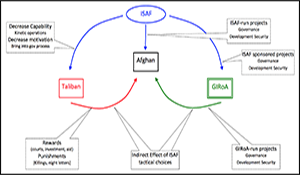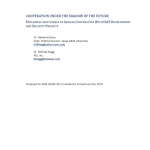Afghan Cooperation with ISAF Development Projects

Cooperation Under the Shadow of the Future: Explaining Low Levels of Afghan Cooperation with ISAF Development and Security Projects.
Author | Editor: Geva, N. & Bragg, B. (NSI, Inc).
This project addresses two major interrelated objectives. The first objective is a substantive one: we are interested in better understanding why Afghan participation in ISAF and ISAF-sponsored initiatives is low, even when participation offers the opportunity for significant near-term benefits. We contend that the ISAF mission in Afghanistan presents a clear example of a shadow of the future decision problem for the Afghan people. Specifically, that low levels of Afghan participation result from the knowledge that ISAF presence is finite and that, after ISAF withdraws, insurgents will punish those who cooperated effectively negating the value of any benefits gained from that cooperation. This situation presents a serious policy challenge for ISAF, and a better understanding of the dynamics and factors that affect Afghans collaboration with ISAF’s local initiatives will help develop policies that can mitigate the current situation.
The second, broader, objective is to demonstrate the utility of the experimental method to the work being conducted by SMA and other groups supporting US forces in complex environments such as Afghanistan. That is, we posit that experimentation can help us understand (test hypotheses and provide empirical evidence) complex contexts where data are scarce and the data that is available are problematic.
The utility of the experimental method is tested in the context of the substantive question of this project: Why are Afghan citizens reluctant to cooperate with small-scale initiatives started by ISAF forces? Their intention is to improve conditions for the Afghan people as well provide incentives to support the consolidation of an Afghan governed nation. While there are several potential accounts of why the Afghans do not collaborate with ISAF – mostly cultural – in this paper we explore the utility calculations of the Afghans. We focus mainly on the Afghan perception of the major counter force to prevent such collaboration, that is, the Taliban. In their attempt to stop such cooperation the Taliban conducts nightly deterrent acts, which include addressing threatening letters to the locals and sabotage for those collaborating with the American forces. We argue that in addition to these small-scale Taliban attacks – there is another dark cloud hovering in the future. The fact that The ISAF’s commitment is finite and the related issue of the future relative strength of the Taliban versus the ISAF established Afghan government.
This study presents a conceptual model designed to help explain why Afghan citizens are reluctant to cooperate with ISAF projects intended to improve their quality of life in the near-term. Rather than rely on cultural or historical explanations for this reluctance we propose that this behavior is consistent with rational calculation that gives weight to future costs as well as near-term benefits. It is this shadow of the future that undercuts the perceived benefits to cooperation and decreases individuals’ willingness to cooperate with ISAF projects.
Although preliminary these findings suggest several important factors that need to be taken into consideration when determining the likely response to ISAF projects.
- The shadow of the future matters: The perception that GIRoA will not emerge as the stronger actor once ISAF leaves is critical in preventing cooperation with ISAF projects in the present
- These results suggest that not all subjects are utility maximizers, rather decisions are based on the principle of minimizing potential losses. This is most clearly demonstrated by the choice to pay off Taliban or sit on fence
- Choice can in some instances be better understood as driven by minimizing risk, rather than by the potential for gain.
These findings support the current ISAF focus on strengthening GIRoA’s governing capacity. If Afghans develop greater trust in the strength of GIRoA; its capacity to provide basic governance functions such as security and rule of law; then the impact of the shadow of the future will begin to decrease. As concern over future reprisals diminishes, cooperation with ISAF projects can be expected to increase. As increased cooperation and investment in ISAF projects indirectly reinforces the governance capabilities of GIRoA over time a positive feedback loop should develop.

Comments